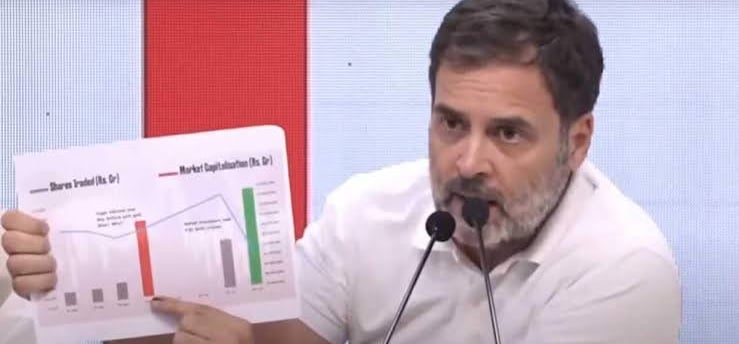Add your promotional text...
Rahul Gandhi’s Stock Market Gains Amidst Criticism of Modi 3.0’s Market Boom: A Deeper Look
Synopsis: Amidst Prime Minister Narendra Modi's third term, which has seen unprecedented growth in the Indian stock market, opposition leader Rahul Gandhi has publicly questioned the sustainability of this boom. Despite his skepticism, recent data reveals that Gandhi's stock portfolio has earned him a profit of Rs 46.49 lakh over the past five months. This blog delves into Gandhi’s investment gains, his diversified portfolio, and the broader market dynamics, including the impact of recent allegations against SEBI by Hindenburg Research, highlighting the complex interplay between politics and finance in India.
VIEWS ON NEWS
By Monika Agarwal
8/13/20243 min read


As the Indian stock market continues to soar under Prime Minister Narendra Modi’s third term, opposition leader Rahul Gandhi has expressed doubts about the rapid growth of the markets. Despite his skepticism, data reveals that Gandhi himself has benefited significantly from his stock investments over the past five months, earning a profit of Rs 46.49 lakh. This intriguing contrast between public criticism and private gains offers a unique perspective on the current market scenario.
Rahul Gandhi’s Portfolio: A Detailed Examination
Rahul Gandhi’s stock market portfolio has seen notable growth, increasing from approximately Rs 4.33 crore on March 15, 2024, to nearly Rs 4.80 crore by August 12, 2024. This substantial increase in value has occurred during a period when Gandhi has been vocal about his concerns regarding the stock market’s performance under the Modi administration.
The stocks in Gandhi’s portfolio include a mix of large-cap and mid-cap companies, such as Asian Paints, Bajaj Finance, Deepak Nitrite, Divis Labs, GMM Pfaudler, Hindustan Unilever, Infosys, ITC, TCS, Titan, Tube Investments of India, and LTIMindtree. His portfolio is diversified across various sectors, reflecting a balanced investment strategy.
Interestingly, out of the 24 stocks in his portfolio, Gandhi is currently facing losses in only four companies: LTIMindtree, Titan, TCS, and Nestle India. Despite these minor setbacks, the overall performance of his investments has been strong, contributing to his substantial profit.
The Impact of Small-Cap Stocks
Gandhi’s portfolio also includes shares of smaller companies, such as Vertoz Advertising Ltd and Vinyl Chemicals. These stocks, while less prominent than the large-cap companies, have contributed to the overall growth of his portfolio. For instance, a corporate action in Vertoz Advertising Ltd resulted in a significant increase in the number of shares he holds in the company, rising from 260 shares in March 2024 to 5,200 shares by August 2024.
This focus on smaller, high-potential stocks indicates a keen eye for growth opportunities, which has paid off well for Gandhi, even as he publicly questions the robustness of the broader market.
Modi 3.0 and the Market Boom
The Modi government’s third term has been marked by an unprecedented surge in the Indian stock markets. The Sensex and Nifty indices have repeatedly broken records, reaching new highs and delivering strong returns to investors. Since the beginning of 2024, the Sensex has provided returns of approximately 11 percent, while the Nifty has yielded around 12 percent, further reinforcing the bullish market sentiment.
This growth has not gone unnoticed, with many attributing it to the government’s pro-business policies, economic reforms, and a generally favorable global economic environment. However, Rahul Gandhi has remained critical, suggesting that the market’s growth may not be as organic or sustainable as it appears.
Rahul Gandhi’s Call for a JPC Probe
In a recent video message, Rahul Gandhi called on Prime Minister Modi to initiate a Joint Parliamentary Committee (JPC) probe into the allegations against the Securities and Exchange Board of India (SEBI) chief. These allegations, raised by the US short-seller Hindenburg Research, suggest that the integrity of India’s securities regulator has been compromised, which Gandhi argues could endanger the wealth of small retail investors.
Despite these concerns, the market’s response to the Hindenburg allegations has been largely muted. On the Monday following Gandhi’s statements, the benchmark indices closed nearly flat, indicating that investors are not overly concerned about the accusations. This reaction reflects the market’s resilience and the continued confidence of investors in the Indian economy.
The Hindenburg Controversy: A Market Perspective
The Hindenburg Research firm has made headlines in the past with its claims against prominent Indian conglomerates, most notably the Adani Group. However, previous investigations, including one monitored by the Supreme Court of India, have found no substantial evidence to support these claims. SEBI also issued a show-cause notice to Hindenburg for allegedly violating market rules.
Sushil Kedia, Founder and CEO of Kedianomics, argues that Hindenburg’s recent allegations are another attempt to destabilize the Indian stock market by undermining the trust of retail investors. He suggests that these claims are part of a broader strategy to create uncertainty in the market, which could potentially benefit short-sellers at the expense of long-term investors.
Conclusion: A Complex Interplay of Politics and Markets
Rahul Gandhi’s stock market gains, juxtaposed with his criticism of the market’s growth under the Modi government, highlight the complex interplay between politics and finance in India. While Gandhi raises valid concerns about market integrity and regulatory oversight, his personal investment success suggests that the market remains robust and profitable, at least for those who invest wisely.
As the Indian stock market continues to navigate the challenges and opportunities of Modi 3.0, investors and policymakers alike must remain vigilant. The lessons from Gandhi’s portfolio are clear: diversification, strategic stock selection, and a cautious approach to market rumors are essential for success in an environment where both political and economic factors are in constant flux.
